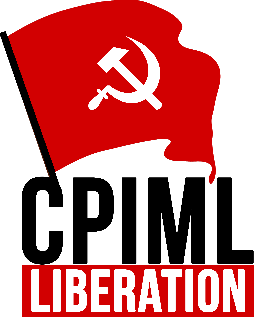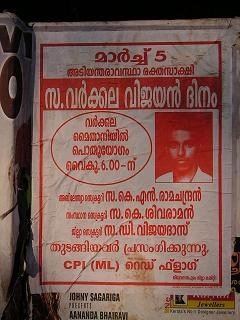
The Communist Party of India (Marxist) (abbreviated as CPI(M)) is a communist political party in India. It is the largest communist party in India in terms of membership and electoral seats, and one of the national parties of India. The party was founded through a splitting from CPI in 1964 and it quickly became the dominant fraction.

The Communist Party of India (Marxist–Leninist) (CPI (ML)) was an Indian communist party formed by the All India Coordination Committee of Communist Revolutionaries (AICCCR) at a congress in Calcutta in 1969. The foundation of the party was declared by Kanu Sanyal at a mass meeting in Calcutta on 22 April, Vladimir Lenin's birthday. Later the CPI(ML) party splintered into several Naxalite groups.
Communist Party of India (Marxist–Leninist) Janashakti, abbreviated CPI (ML) Janashakti, was a communist political party in India. In 2013, CPI (ML) Jansakthi merged into CPIML.

Communist Party of India (Marxist–Leninist) is a communist party in India. The party is one of many working under the name of CPI (ML). The party general secretary was Kanu Sanyal. The name of the party is identical to the original Communist Party of India (Marxist–Leninist) formed in 1969, of which Sanyal was also a key leader, but Sanyal has stated that his party is not the same as this party.

The Communist Party of India (Marxist–Leninist) Liberation is a communist political party in India. The party is represented in Bihar and Jharkhand Legislative Assemblies. Since 2023, the party is also a member of the INDIA electoral alliance.
Communist Party of India (Marxist–Leninist) Naxalbari was an underground Maoist political party in India. The party had its roots partially in the Maoist Unity Centre, CPI (ML) and partially in the group of Rauf in Andhra Pradesh.

The Provisional Central Committee, Communist Party of India (Marxist–Leninist) was a communist political party in India. The general secretary of the party was Santosh Rana. The party is often referred to as CPI(ML) [Santosh Rana Group] or likewise.

Unity Centre of Communist Revolutionaries of India (Marxist–Leninist) was created through the merger of Andhra Pradesh Coordination Committee of Communist Revolutionaries, Northern Zone Committee RCUC(M-L), West Bengal Communist Unity Centre and West Bengal Co-ordination Committee of Revolutionaries (WBCCR). The formation took place at a unity conference in April 1975. The unity conference adopted a resolution on martyrs, programme, path, method of work, constitution and a statement on unification. The unity conference elected a Central Committee with Devulapalli Venkateswara Rao as its secretary. UCCRI(ML) had as its ambition to unite all communist revolutionary forces, including people within the Communist Party of India (Marxist-Leninist) fold. UCCRI(ML) started publishing the SPARK as its central organ.

Communist Party of India (Marxist–Leninist) Red Flag was formed in 1988 as a break-away from the Central Reorganisation Committee, CPI (ML).
Communist Party of India (Marxist–Leninist) Central Team was formed in 1977 when activists from Punjab, Maharashtra and West Bengal of Communist Party of India (Marxist–Leninist) of Satyanaryan Singh revolted against the party leadership. CPI(ML) Central Team reaffirmed the legacy of Charu Majumdar.
The Central Reorganisation Committee, Communist Party of India (Marxist–Leninist) was a communist group in India 1979–1991. The Secretary of the All-India Leading Committee of the CRC, CPI(ML) was K. Venu. The main organ of CRC, CPI(ML) was called Mass Line. CRC, CPI(ML) also published Liberation and Comrade.

Communist Organisation of India (Marxist–Leninist) was a political organisation in India. COI (ML) was formed in May 1985 through the merger of six different groups;

N. V. Krishnaiah was a communist politician from Andhra Pradesh, India. He was a municipal councillor in Nellore, member of the Andhra Pradesh legislature, president of the Indian Federation of Trade Unions and a central leader in the Communist Party of India (Marxist-Leninist).
Communism in India has existed as a social or political ideology as well as a political movement since at least as early as the 1920s. In its early years, communist ideology was harshly suppressed through legal prohibitions and criminal prosecutions. Eventually, communist parties became ensconced in national party politics, sprouting several political offshoots.

The Marxist-Leninist Party of India , previously the Communist Party of India (Marxist-Leninist) Red Flag, is a communist party in India. The party is one of the most moderate factions of the wider Naxalite movement.
Communist Party of India (Marxist–Leninist) People's War, usually called People's War Group (PWG), was an underground communist party in India. It merged with the Maoist Communist Centre of India to form the Communist Party of India (Maoist) in 2004. Muppala Lakshmana Rao ('Ganapathi') was the general secretary of the party. The ideology of the party was Marxism-Leninism-Maoism.
The Central Organising Committee, Communist Party of India (Marxist–Leninist) Party Unity, more commonly known as CPI(ML) Party Unity or simply 'Party Unity', was a communist party in India 1982-1998. Narayan Sanyal alias Naveen Prasad was the general secretary of the party. Party Unity was the official organ of the party. CPI(ML) Party Unity was one of the predecessors of the Communist Party of India (Maoist).
The International Conference of Marxist–Leninist Parties and Organizations (ICMLPO) was an international grouping of political parties and organizations adhering to Mao Zedong Thought founded in 1998 by the Marxist-Leninist Party of Germany. It was organized by a Joint Coordination Group and met every two or three years. It ceased to exist in 2017.
Central Organising Committee, Communist Party of India (Marxist–Leninist) was a communist party in India, one of the main splinter factions of the original Communist Party of India (Marxist–Leninist). COC, CPI(ML) occupied a middle position between the pro-Charu Majumdar group led by Mahadev Mukherjee and the anti-Majumdar group led by Satyanarayan Singh. Failing to articulate a common ideological position, COC, CPI(ML) soon suffered internal divisions and splits. Two of the splinter groups of COC, CPI(ML) in Andhra Pradesh are predecessors of the present-day Communist Party of India (Maoist).






